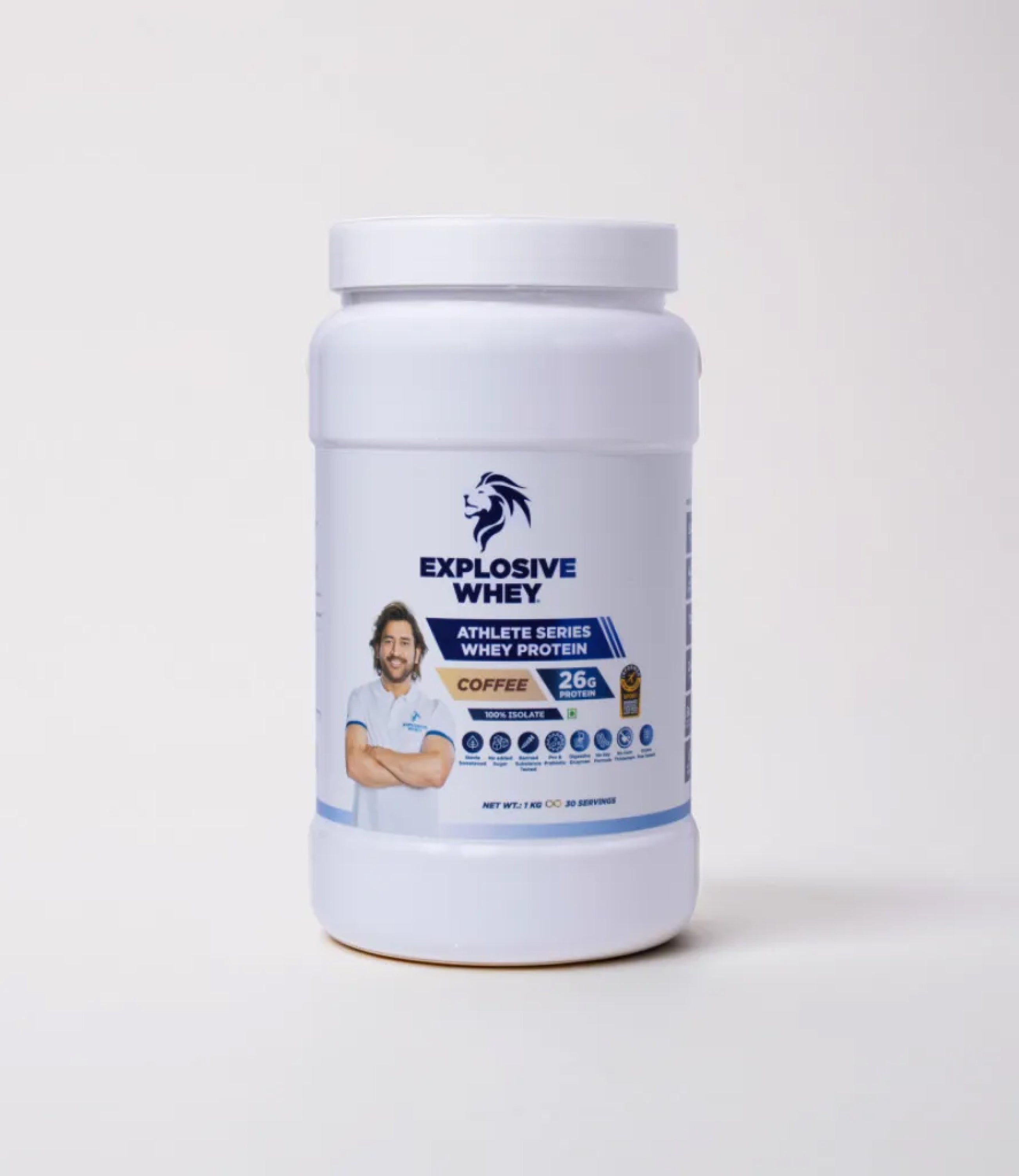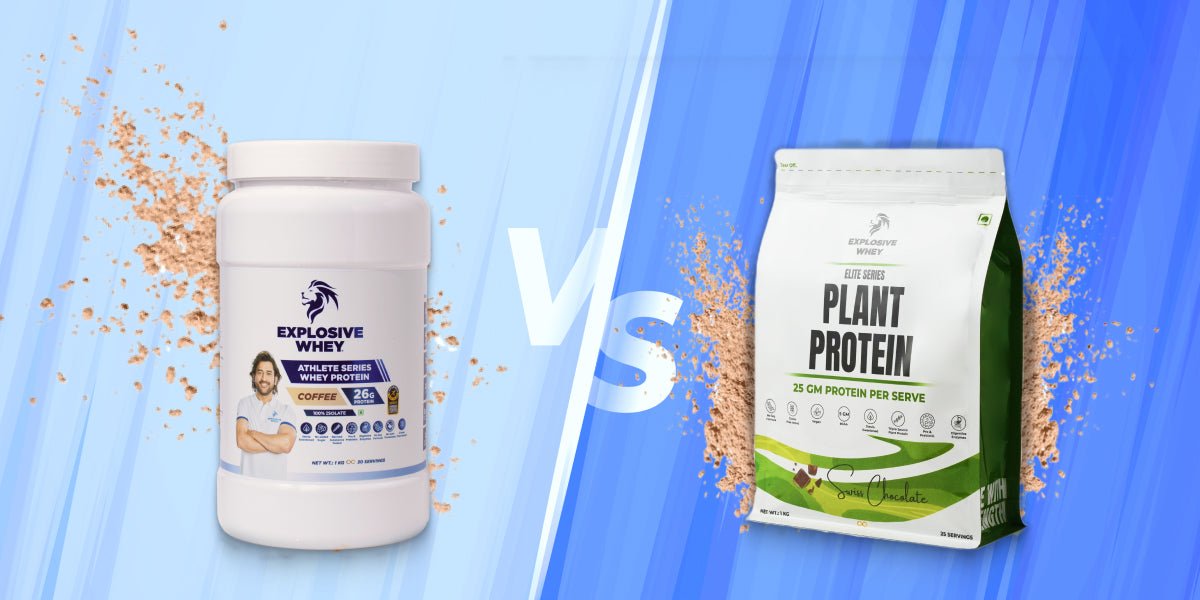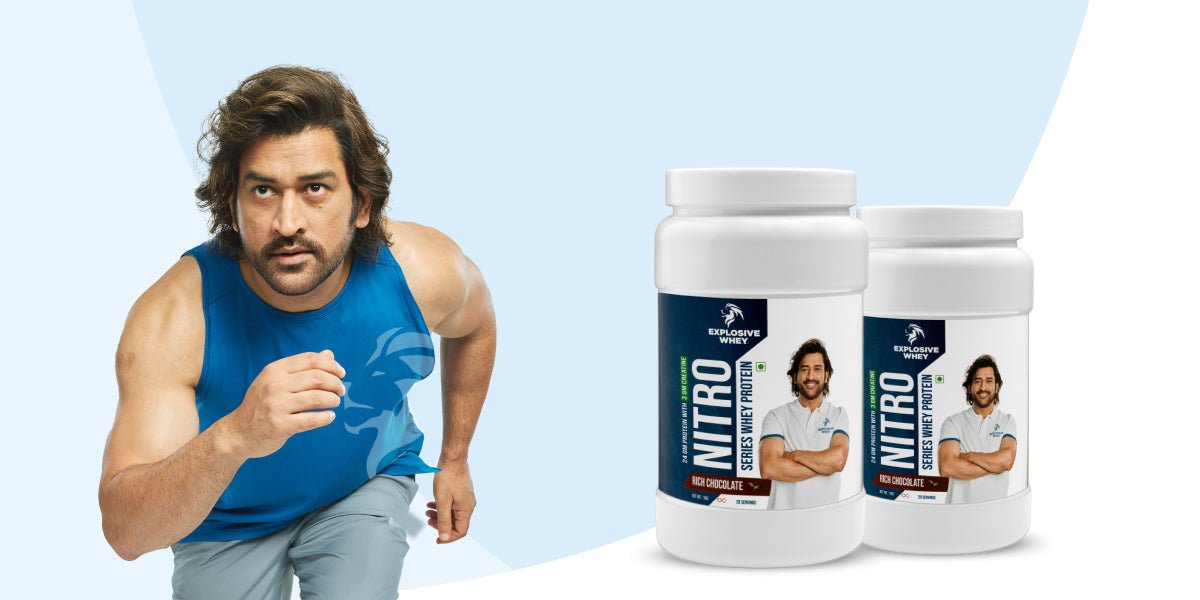Choosing the right protein supplement can be tricky, especially with options like plant-based and whey protein available. Both have their unique benefits, and deciding which one is right for you depends on your goals, dietary preferences, and lifestyle. This blog compares Plant vs Whey Protein to help you make an informed choice.
Comparing Plant vs Whey Protein for Better Nutrition
Protein is essential for muscle recovery, performance, and overall health. However, understanding the differences between Plant vs Whey Protein can help you select the one that best fits your needs. Let's dive into the details of each to see which protein is right for your fitness goals.
Whey Protein: What You Need to Know

Among protein sources, whey protein ranks as one of the most popular.. It is a complete protein derived from milk and is known for its quick absorption, making it ideal for post-workout recovery. Here's an overview of whey protein's benefits and uses.
Understand Whey Protein's Origin
Whey protein is a byproduct of cheese production. It’s the liquid left after milk has been curdled and strained. Whey is a complete protein, containing all the essential amino acids required by the body, which makes it ideal for muscle building and recovery.
Explore Whey Protein Types
There are different types of whey protein, including whey protein concentrate and isolate. The most common form is whey protein concentrate, which contains around 70-80% protein. Whey protein isolate is processed further to remove fats and lactose, making it a great option for those who are lactose intolerant.
Optimal Time and Dosage
Whey protein is best consumed within 30 minutes after a workout to support muscle repair. You can mix one scoop (around 20-30g) with water or milk to boost your recovery. You can also have whey protein between meals to increase your daily protein intake.
Benefits
Whey protein offers multiple benefits that support training, recovery, and overall performance. It’s an easy way to fuel your body and get stronger without overthinking your diet.
Supports Muscle Development
Whey protein is rich in leucine, an amino acid that stimulates muscle protein synthesis. This makes it particularly effective for muscle growth, strength, and recovery after intense training sessions.
Enhance Post-Exercise Recovery
Whey protein's fast digestion rate helps in muscle recovery after intense workouts. It provides your body with essential amino acids quickly, reducing muscle soreness and promoting faster recovery times.
Maintain Lean Muscle Mass
Consuming whey protein regularly helps in maintaining lean muscle mass. This is particularly important for athletes and bodybuilders who are working on muscle preservation, fat loss, or weight loss goals.
Plant Protein: A Comprehensive Guide

Plant protein is derived from various plant sources like peas, rice, hemp, and seeds. It is an excellent option for vegetarians, vegans, or anyone looking for an alternative to animal-based proteins. Here's more about plant protein and its benefits.
Discover Plant Protein Sources
Common sources of plant protein include peas, brown rice, hemp, and pumpkin seeds. Each source has a unique amino acid profile, and plant-based proteins can often be combined to make a complete protein source. These proteins are also naturally free from lactose, making them a great choice for those with lactose sensitivity.
Evaluate Plant Protein Nutrition
Plant protein is often high in fiber and antioxidants, which are beneficial for overall health. While some plant proteins may be lower in certain amino acids, when combined correctly, they can provide all the essential amino acids needed for muscle building and recovery.
Optimal Time and Dosage
Just like whey, plant protein can be taken post-workout to help with recovery. You can mix one scoop (20-30g) of plant protein into a smoothie or shake. Plant protein is also an excellent addition to your daily meals for extra nutrition.
Benefits
Plant protein offers a lighter, more plant-powered alternative that suits people with different dietary needs.
Rich in Fiber and Antioxidants
Plant proteins are packed with fiber and antioxidants that promote digestive health and protect your body from oxidative stress. These nutrients help maintain a healthy immune system and improve overall wellness.
Supports Heart Health
The fiber, healthy fats, and antioxidants in plant protein help reduce cholesterol and improve cardiovascular health. These benefits make plant protein a heart-healthy option for those who want to maintain their overall well-being.
Aids Digestion and Gut Health
Plant proteins are easier to digest for many people, especially for those with lactose intolerance or digestive sensitivities. The fiber content also supports a healthy gut microbiome, promoting better digestion.
Side-by-Side Comparison of Plant vs Whey Protein
|
Feature |
Whey Protein |
Plant Protein |
|
Source |
Dairy-based (from milk) |
Derived from natural plant sources (pea, pumpkin seed, brown rice) |
|
Digestibility |
Quickly absorbed, ideal post-workout |
Gentle on the stomach, great for daily use (post-workout) |
|
Amino Acid Profile |
Naturally complete |
Complete when sourced from a blend |
|
Lactose Content |
Available in lactose-free (isolate) options |
Naturally lactose-free |
|
Sustainability |
Produced from dairy farming |
Eco-conscious and sustainable sourcing |
|
Dietary Suitability |
Popular among athletes of all levels |
Suitable choice for vegans, vegetarians, and plant-based diets |
Tailoring Protein Choices to Your Fitness Goals

Choosing between plant vs whey protein depends on your fitness goals and dietary preferences.
Weight Management and Appetite Balance
Plant proteins are rich in fiber, which helps keep you feeling full longer. This makes plant-based protein ideal for weight management or those looking to control appetite, making it a great choice for healthy, sustainable weight loss.
Muscle Building and Recovery
Whey protein, with its fast digestion rate, is perfect for muscle recovery post-workout. It’s particularly beneficial if you aim for rapid muscle growth or faster recovery, helping you bounce back quickly for your next intense training session.
Supporting Daily Nutrition
For daily nutrition, plant protein can be an excellent addition to your meals, providing a balanced nutrient profile that supports overall health. It is gentle on the stomach and works well for everyday use, offering long-lasting energy and vitality throughout the day.
Performance Support for All Levels
Both proteins support athletic performance. Whey protein offers quicker absorption, ideal for immediate post-workout recovery, while plant protein provides a slower release, offering sustained support throughout the day, helping you maintain consistent energy during your activities.
Both plant and whey protein have their unique advantages. Whey protein is perfect for those looking for fast digestion and muscle growth, while plant protein offers a heart-healthy, sustainable option for vegans and those looking to avoid dairy. Your choice between Plant vs Whey Protein should be guided by your personal health goals, workout routine, and dietary preferences.
FAQ
Q1) Which protein is better, plant or whey?
It depends on your dietary preferences and fitness goals. Whey is faster-absorbing and ideal for muscle recovery, while plant protein is great for those with digestive sensitivities or a plant-based diet.
Q2) Is whey or plant protein better for fat loss?
Both can aid in fat loss when combined with a calorie-controlled diet. Whey protein helps with muscle maintenance, while plant protein offers added fiber, which helps with satiety.
Q3) Which protein is better for weight management?
Plant protein, due to its higher fiber content, is more beneficial for weight management as it helps control hunger and promotes fullness.
Q4) Is plant protein as effective as whey protein for muscle building?
Yes, plant protein can be just as effective when sourced from high-quality blends, although whey protein has a more complete amino acid profile for muscle building.










Leave a comment
This site is protected by hCaptcha and the hCaptcha Privacy Policy and Terms of Service apply.